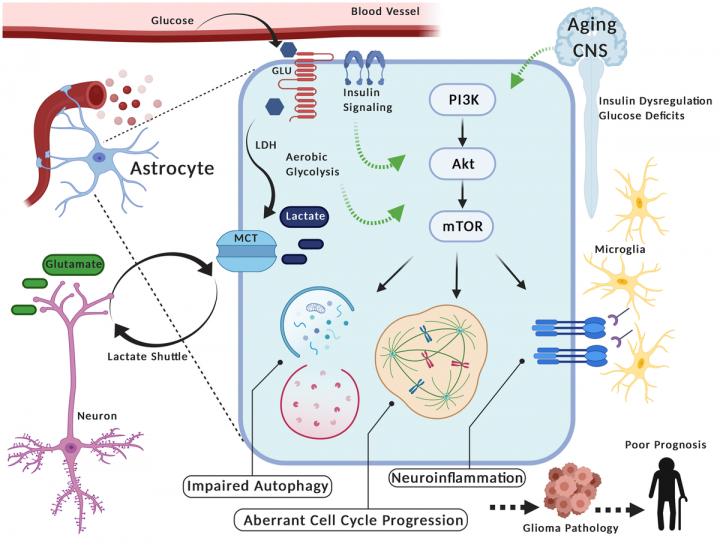‘The consideration of aberrant PIK3/AKT/mTOR signaling in glia during aging elucidates several therapeutic opportunities for brain tumors’

Credit: Correspondence to: Kamel Khalili email: [email protected]
Aging-US Issue 1 Volume 13 features “PAM (PIK3/AKT/mTOR) signaling in glia: potential contributions to brain tumors in aging” which reported that despite a growing proportion of aged individuals at risk for developing cancer in the brain, the prognosis for these conditions remains abnormally poor due to limited knowledge of underlying mechanisms and minimal treatment options.
While cancer metabolism in other organs is commonly associated with upregulated glycolysis and hyperactivation of PIK3/AKT/mTOR pathways, the unique bioenergetic demands of the central nervous system may interact with these oncogenic processes to promote tumor progression in aging. Specifically, constitutive glycolysis and PIK3/AKT/mTOR signaling in glia may be dysregulated by age-dependent alterations in neurometabolic demands, ultimately contributing to pathological processes otherwise associated with PIK3/AKT/mTOR induction.
Although several limitations to this theoretical model exist, the consideration of aberrant PIK3/AKT/mTOR signaling in glia during aging elucidates several therapeutic opportunities for brain tumors, including non-pharmacological interventions.
Dr. Kamel Khalili from Temple University said, “Cancer in the brain is significantly less common than in other organs, but disproportionately contributes to higher rates of mortality“
Since metabolic syndrome is an independent risk factor for worse prognosis in patients with certain CNS tumors, bioenergetic processes in particular are emerging as important variables in tumor neuropathology.
Among primary cell types implicated in tumor pathogenesis, minimal contributions are observed from non-glia; less than 10% of all tumors manifest as lymphomas, meningiomas, embryonal tumors, or choroid plexus carcinomas, among others.
As tumors of glial origin account for the vast majority of all CNS cancers, age-dependent variation in glial functioning may particularly contribute to tumor pathology in the brain.
Within the CNS, astrocytes in particular have long been associated with metabolic homeostasis and are the most common cell type associated with tumor pathology.
Given that glia are responsible for maintaining energy homeostasis of the CNS by utilizing similar metabolic pathways of cancer cells, chronic alterations in bioenergetic demands during aging.
The Khalili Research Team concluded in their Aging-US Review Article that in particular, the inhibition of PI3K’s downstream effectors, AKT and mTOR, may prove to reliably mitigate proliferation, motility and viability in glioma cells.
Additionally, PI3K inhibitors are emerging as potent antagonistic agents in various types of cancer, including gliomas.
While cancer cells have been shown to overcome this inhibition, evidence from preclinical models suggest the combination of dietary manipulations as well as PI3K inhibitors can augment the inhibition of PAM signaling and increase therapeutic efficacy.
Compared to mice treated with PI3K inhibitors alone, mice maintained on a ketogenic diet during treatment display significantly decreased mortality rates following intracranial implantation of aggressive human gliomas.
Although further validation of these targets is required, the modulation of PAM signaling to mitigate glioma progression in the aging CNS may prove efficacious and merits consideration.
###
Full Text – https:/
Correspondence to: Kamel Khalili email: [email protected]
Keywords: glioma, aging, bioenergetics
About Aging-US
Launched in 2009, Aging-US publishes papers of general interest and biological significance in all fields of aging research as well as topics beyond traditional gerontology, including, but not limited to, cellular and molecular biology, human age-related diseases, pathology in model organisms, cancer, signal transduction pathways (e.g., p53, sirtuins, and PI-3K/AKT/mTOR among others), and approaches to modulating these signaling pathways.
To learn more about Aging-US, please visit http://www.
Aging-US is published by Impact Journals, LLC please visit http://www.
Media Contact
18009220957×105
[email protected]
Media Contact
Ryan James Jessup
[email protected]
Original Source
https:/
Related Journal Article
http://dx.




